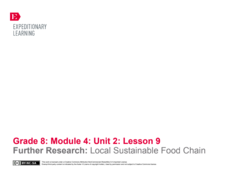EngageNY
Local Sustainable Food Chain: Determining Cascading Consequences Using The Omnivore’s Dilemma
What are the consequences of the local, sustainable food chain? Research teams explore the question as they review Michael Pollan's The Omnivore's Dilemma. The teams complete Cascading Consequences charts and then choose research topics...
EngageNY
Further Research: Local Sustainable Food Chain
Researchers review how to create citations, find reliable sources, and paraphrase. Next, using guided task cards and their researcher's notebooks, they investigate the question they developed in instructional activity eight about the...
EngageNY
Adding to Cascading Consequences and Stakeholders: Local Sustainable Food Chain
Equip the class to perfect their presenting skills. To prepare for an upcoming oral presentation, scholars create and analyze an anchor chart for effective speaking skills. Pupils also use their research to add to their Cascading...
Curated OER
Ecosystem Lesson Plan: Food Chain/Food Web
Students discuss ecosystems, eliciting their current knowledge of an ecosystem. Students receive an Ecosystems document and look at the picture. Students brainstorm connection between the cover picture and ecosystems. The indicated...
Curated OER
5 Step Food Chain Lesson
Have your class discuss food chains using this resource. Learners watch a presentation on the food chain and how we are dependent on the smallest life forms. They write newspaper articles and create an illustration describing the food...
Wild BC
Bearly Any Ice
After reviewing food chains, your class members participate in an arctic predator-prey game that exemplifies the impact of climate change of food availability. If you are in a hurry, skip this lesson, but if you have the time to...
Howard Hughes Medical Institute
Creating Chains and Webs to Model Ecological Relationships
The sustainability of an ecosystem depends on many factors and changes constantly. Young scholars consider these factors as they use a set of cards to create food webs. They review key scientific vocabulary such as predator, prey,...
Curated OER
Go With the Energy Flow
Students explore energy and nutrient flow. For this science lesson, students diagram the flow of energy through food chains and food webs. Students discuss the importance of energy flow in Earth's ecosystems.
EngageNY
Reading for Gist and Answering Text-Dependent Questions: Local Sustainable Food Chain
Readers use sticky notes and a Reading Closely: Guiding Questions handout to record the gist of a different section (pages 161-166) in The Omnivore’s Dilemma. They then pair up and share their ideas. To end the lesson, readers complete...
NOAA
Sustaining Our Ocean Resources
Lead young scientists on an investigation of fishery practices with the final installment of this four-part unit. Using a PowerPoint presentation and hands-on simulation, this lesson engages children in learning how fish populations are...
Channel Islands Film
Human Impact on the Food Web of Santa Cruz Island
What happens when a non-native species is introduced onto an island? Santa Cruz Island, part of the Channel Island chain located off the coast of southern California, provides the perfect laboratory for young environmental scientists to...
Curated OER
Biomes of the World (and Canada)
Students explore environments by analyzing food chains. In this biome identification lesson, students define a list of environmental vocabulary terms such as tundra, rain-forest and desert. Students create a fictional self sustainable...
Curated OER
Sustainability and Extinction
Galapagos Penguins are the only penguins on earth that live north of the equator (in the wild). In this last lesson plan a discussion on how the Galapagos islands developed their populations and diversity sparks the introduction. Two...
Chicago Botanic Garden
Nature Walk and Ecosystem Introduction
A food web has no organism higher than a tertiary consumer because there wouldn't be enough energy left to sustain them. The fourth installment in a seven-part series begins with a nature walk to get pupils thinking about their...
TerraCycle
What Can Nature Teach Us about Sustainable Design?
Talk about Velcro®, Gecko Tape, WhalePower turbine blades, and other innovations that mimic nature to inspire your STEM or engineering class. This set of worksheets gets them thinking about imitating nature in terms of sustainable...
Curated OER
Obtaining Food -- The Impact of Over-fishing
Students play a fishing game. In this food supply lesson students regulate their fishing in a game about over-fishing. The students identify resources that could be extracted from that biome.
Curated OER
Predator and Prey Game
Students explore the why the balance among producers, predators and prey is necessary in order for an ecosystem to be sustained over time. Through web games and activities, they discover how each component of the food chain works to...
Curated OER
Slow Food: A Different Path
Young scholars investigate the slow food movement through a reading and activity. In this slow food lesson, students read about the differences in fast food and slow food and the ties to sustainable agriculture. They nominate a local...
EngageNY
Making a Claim and Advocating Persuasively: Preparing for the Practice Fishbowl
Scholars consider their reading in The Omnivore's Dilemma to develop a claim answering the question, "Which food chain would you choose to feed your family—the local sustainable food chain or the hunter-gatherer food chain?" To guide...
Curated OER
Food Without Oil
Students discuss the oil crisis and how it affects the food they eat. In this food production lesson plan, students look at the foods sold in their grocery store and imagine which would leave if there was no oil to ship the food. They...
Consortium for Ocean Science Exploration and Engagement (COSEE)
Arctic Smorgasbord
Though the walrus spends roughly one third of its time on land, it eats organisms that live on the bottom of the ocean. The first in a series of five, the lesson uses a variety of plant and animal cards to have scholars build an arctic...
Curated OER
Making a Food Web and Learning About Ecosystems
Third graders examine the difference between a food web and food chain. They also examine the importance of the sun in a food web and food chain. Students understand what happens when you remove parts of the chain.
Curated OER
Empty Oceans
In groups of four, pupils brainstorm about seafood. They view the Monterey Bay Aquarium Seafood Watch website to examine the problems caused by the seafood industry. Learners are then brought back together to discuss what they...
Curated OER
Food and You
Students identify why humans are dependent on natural resources and the problems associated with their use and demonstrate how humans affect their environment. They also describe the different components and natural resources that go...

























